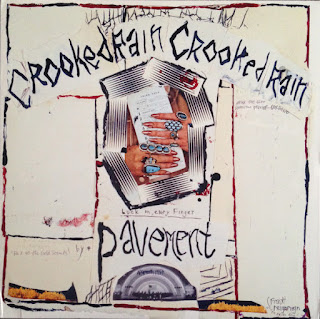Fennesz - Venice (Album Review)
Fennesz - Venice
(2004)
My copy: 2014 reissue by Touch.
Following the relative breakout success of Endless Summer, Austrian native Christian Fennesz released a live record, a collection of field recordings, and spent some time collaborating with other electronic artists. In 2004, Fennesz traveled to Venice to record his next full-length: a series of nebulous ambient/glitch tracks containing both moments of intense noise and surreal melody, aptly named for the city it was conceived in.
For the ten year anniversary, two bonus tracks were added. “The Future Will Be Different” is the first bonus track, setting the pacing with thick background noise and bassy acoustic guitar pecking. This song is reminiscent of “Endless Summer” but works in some dissonance, perhaps foreshadowing new ideas. Glitched fragments of auditory memories pour through “Rivers Of Sand” with wavering high frequencies and a structure that reworks itself seemingly at random, rising steadily like a heartbeat. The introductory drone on “Chateau Rouge” might catch you off guard, before the song is re-expanded into glimmering chimes that flicker over pockets of synth. The music here is less prone to sudden bursts like Endless Summer, instead settling in early and mixing in ghostly mechanical droning piece by piece.
“City Of Light” is more subtle - deep synths overlap and stack, which would instill anxiety were the mix not so finely attuned. “Onsra” is the first song to feature guitar from Burkhard Stangl, and opens wide into a combination of shoegazing and heavy ambient, allowing the best of both worlds to be harnessed. “Circassion” is gentle and grows slowly until “Onsay” introduces warm pops and clicks that sound like the musical equivalent of bugs in a computer program. The music flows neatly into “The Other Face” which then recedes to chopped and screwed vocal sounds, buckling to unorthodox rhythms.
David Slyvain provides vocals on “Transit,” utilizing a natural vibrato to add an uncanny flair to the atmosphere. The climactic progressions on “The Point Of It All’ make it fit for some hypothetical experimental film, with guitar that gets buried in EQ tricks. Each sound is more evened out, with individual tracks carrying their own ideas and sticking with them unlike the more jolted identity of Endless Summer. “Asusu” features strangled fuzz, muted but crying out as if it were begging to be freed from some tubular prison. The former’s distortion is freed on “The Stone Of Impermanence” where crackling noise runs free until meditative vibes wash over, with small leftover blasts of energy. Finally, second bonus track “Tree” concludes with breathing, swaying synths and guitar, submitting to a locked groove.
Venice certainly has its own personality, clearly influenced by Fennesz’s time spent in the city. The music is frequently thick and deeply layered, spilling over itself like water coursing through a canal. There are serene moments but they are chosen more carefully, and do not last as long. Endless Summer is more engaging for its daring structural ideas, but Venice is a bit more consistent in its overall identity. Either way, Christian Fennesz’s specialty in warping glitched-out melodies into new, unexpected territories is exhilarating.




Comments
Post a Comment